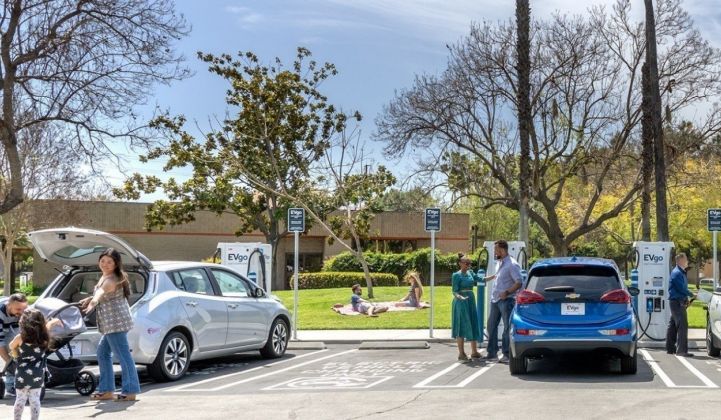LS Power has added EVgo's electric vehicle public fast-charger business to its portfolio of power plants and businesses.
The acquisition, for an undisclosed sum, sets up a new stage in EVgo's evolution, with the backing of a company that's willing to put lots of capital to work for energy infrastructure that moves the grid in a more flexible direction.
EVgo will remain an independent brand within LS Power's portfolio, the companies said in a statement.
EVgo started life at power producer NRG in 2010, part of CEO David Crane's push for forward-looking clean energy businesses. NRG took on an obligation to invest in public charging infrastructure when it acquired gas plants owned by Dynegy. NRG sold control of EVgo to Vision Ridge Partners, a sustainably minded investment firm, in 2016.
"An independent EVgo has built on the foundational leadership of NRG, and we have demonstrated our ability to develop, own and operate reliable and convenient stations where drivers need and want to be," CEO Cathy Zoi said in an email Monday. "EVgo intends to accelerate our growth to serve all EV drivers, and we are truly excited to work with an investor with the history, experience and expertise of LS Power."
Evolving from a regulatory compliance mechanism to a thriving independent business is no sure thing. But under the new leadership of Zoi and Chief Commercial Officer Julie Blunden, the company cranked out new fast chargers, which allow drivers to fill up in "minutes, not hours." It now counts 750 sites across 34 states, which have 1,250 fast chargers — roughly twice as many as when Vision Ridge bought in.
With those numbers, EVgo claims the title of largest public fast-charging network in the U.S. (Charger company ChargePoint bills itself as having "the world’s largest EV charging network," choosing different metrics to highlight.)
EVgo's strategy is to own and operate its stations; the company's revenue is tied to the up-time and performance of its branded stations. That differentiates it from other charger companies that supply equipment or software for customers to operate their own charging stations. EVgo also partners with governments and businesses that want chargers on their property as well as with fleets and rideshare companies in need of charging facilities.
EVgo has been active in gauging the implications of vehicle charging for the broader grid system. It contracted to supply its chargers with 100 percent renewable power and has developed more than a dozen battery projects to mitigate high-powered chargers' impact on the local grid. The company also studies how rideshare fleets consume power and has found that much of their charging happens during California's peak solar curtailment hours, potentially helping with the "duck curve" phenomenon.
LS Power's push into grid-scale batteries
LS Power has displayed a willingness to quietly invest substantial funds in cutting-edge grid technology. The firm develops and acquires generation, including gas and renewables, as well as energy storage and high-voltage transmission lines.
The company made headlines this fall when New York regulators approved a plant to convert 16 outdated combustion turbines to battery storage peakers at LS Power's massive Ravenswood plant in New York City. That project is still in the process of locking down contracts.
But LS had already completed the Vista Energy Storage system in Southern California in 2018; at 40 megawatts, it's the largest power-rated battery plant in the U.S., though it went into service with little fanfare. LS Power's website lists three more storage projects under development in California that would have capacity greater than 100 megawatts, making them among the largest in the world.
That willingness to invest big in relatively new grid infrastructure could translate well to EV charging. Chargers require upfront capital expenditure that pays a return over years; to be ready for the coming EV adoption boom, charging companies need to spend a lot of money to build out their networks now. Whereas Vision Ridge manages $1 billion in assets, LS Power has raised $42 billion for grid infrastructure investments.
This appears to be LS Power's first foray into electric vehicle charging, but it follows a 2018 acquisition of demand response provider CPower.




